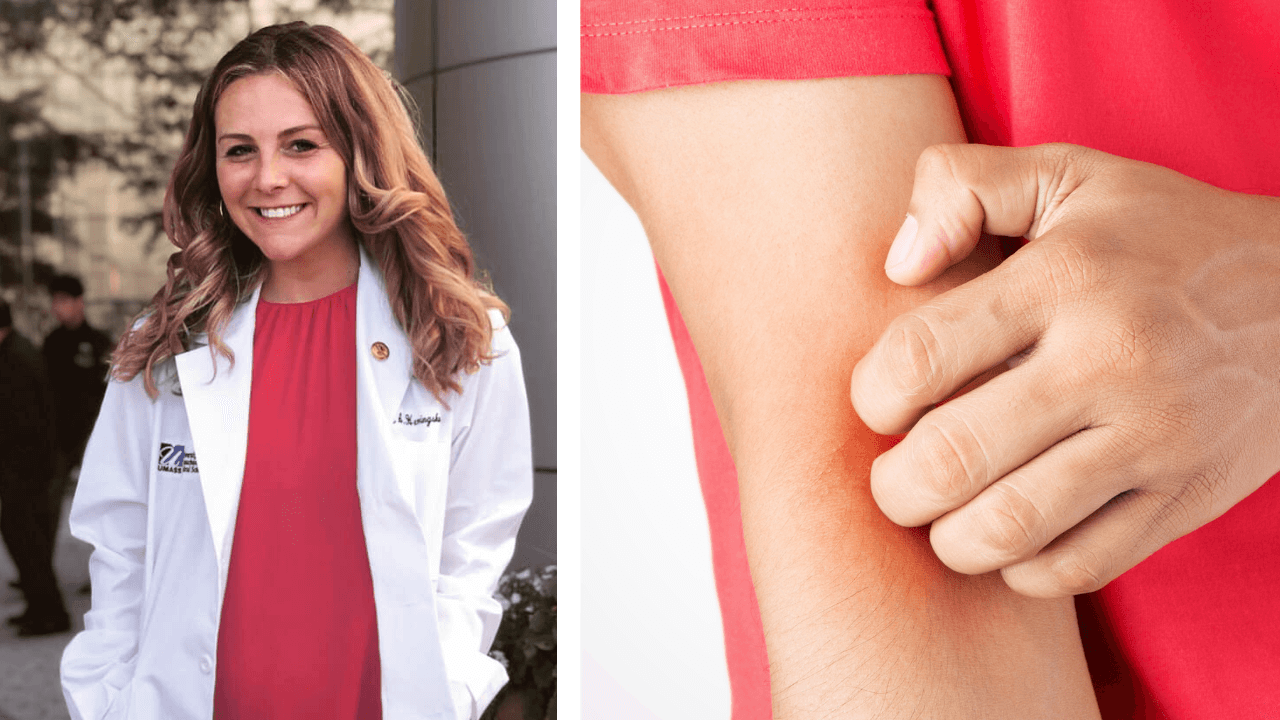Medical School Student Leading Clinical Study to Analyze Skin Reactions to Continuous Glucose Monitors
The diabetes management device market continues to grow with products to help people manage their blood sugar. New technology comes with new problems and challenges including some people developing skin reactions from wearing continuous glucose monitors (CGM).
Emilee Herringshaw was diagnosed with type 1 diabetes as a toddler and is now a fourth year medical student at UMass Chan Medical School where she’s working towards a career in dermatology. She was awarded a clinical research grant by The American Contact Dermatitis Society to create a pilot study designed to evaluate skin reactions to specific models of CGMs, and characterize severity, location(s) involved, and whether variables such as sensor placement or season of wear impact reactions. The study is also investigating attempted interventions and the results of those interventions.
“We developed a standard tool to capture the experience of CGM use,” said Herringshaw. “Patients at the UMass Memorial Diabetes Center of Excellence (DCOE) can take this standardized survey and we will review the results to learn what patterns of skin reactions are developing while wearing these devices.”
“I’m excited that Emilee received the research grant,” said Wei-Che Ko, MD, Director of the Contact Dermatitis Clinic and Research Center at UMass Chan Medical School. “It’s a competitive award and I look forward to continuing to analyze the data with her.”
Funding has been allocated to translate the survey into Spanish and Portuguese, which will allow more patients to participate. Of the initial responses received, more than half reported getting reactions to their CGM sensors. “One item I find interesting so far is that nearly half of the patients who reported reactions had used other CGMs previously, and half of those people did not have a reaction to their first CGM but developed a reaction to their new one,” said Herringshaw.
Emilee has been a type 1 diabetes advocate for many years and continues to be involved with various organizations in the diabetes community. Through those groups she has recognized that skin reactions to CGMs is a prominent issue. “Many people in T1D Facebook groups and on Instagram and Twitter have posted about experiencing reactions to their glucose sensing devices,” she said. “They were asking for help from others who had similar experiences.”
Strategies that have been shared online and by diabetes educators include Flonase, wound dressings or adhesive film dressings, and Skin-Tac™ adhesive barrier wipes.
UMass Memorial DCOE patients who complete the initial survey will be invited to complete a follow up survey after six months, and again at six-month recurring intervals. Emilee has received guidance and support with this project from her endocrinologist, Dr. David Harlan, Co-Director of the UMass Chan Diabetes Center of Excellence, as well as endocrinologist Dr. Samir Malkani, Clinical Chief in the Division of Diabetes, Endocrinology and Metabolism, and Cheryl Barry, RN, Manager of the Adult Diabetes Education Program in the UMass Memorial DCOE.
“They’ve provided invaluable input in the development of the survey tool and registry and will help with interpreting the data obtained from the registry,” said Herringshaw.
You can access the survey here and it's available in the waiting room in the adult diabetes clinic at the UMass DCOE by scanning a QR code. Emilee’s long-term goal for the pilot project is for it to grow into a national study and database.
Related Articles
Emilee Herringshaw: Type 1 Diabetes Success Story
The Latest Blood Glucose Management Tools and Products
Diabetes Nurse Practitioner Nancy Sidhom Describes the Benefits of Continuous Glucose Monitors

